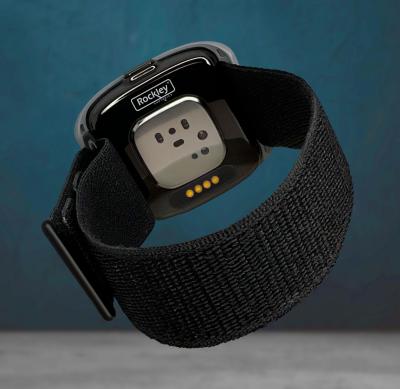In the decade since the first Apple Watch and wrist-worn Fitbit were unveiled, Apple and Google have added progressively more advanced health-monitoring features to their activity-tracking wearables—and have been joined by a swarm of other tech developers throughout that journey.
With electrocardiogram capabilities and blood oxygen level measurements checked off the to-do list, those devicemakers have devoted much of their recent brainpower toward chasing after another pair of particularly complex features: cuffless blood pressure tracking and noninvasive glucose monitoring.
A few have gotten close, but perhaps none so much as Rockley Photonics. The L.A.-area company and longtime Apple partner boasts a system confined entirely to a slim wristband, offering the standard continuous measurements of heart rate, respiratory rate and blood oxygen levels, as well as body temperature, blood pressure, hydration and—in its “Pro” iteration—blood alcohol content, blood lactate and glucose levels.

The “Baseline” version of Rockley’s Bioptx wristband could be on consumers’ wrists as soon as the end of this year, the company said Tuesday, now that it has received the first commercial purchase order for the devices.
Rockley didn’t disclose the buyer of that first order, describing it only as a “global healthcare technology provider.” The first shipment in the order is on track to ship out sometime in the fourth quarter of this year.
The company says its customers can tailor the Bioptx band to their own specifications, by adding or subtracting certain biomarker tracking tools and optimizing battery life and overall performance.
Alongside the commercial order of its wearables, Rockley also announced that it has signed a supply agreement with another unnamed partner.
That initial purchase commitment is set for 2023, and will help ramp up “high-volume production” of Rockley’s biosensing wristbands and other products to meet the growing demand from its medtech customers, according to CEO Andrew Rickman, Ph.D.
Rockley’s Bioptx technology hasn’t yet been authorized by the FDA, but the company said it plans to work with its partners and customers to lock down regulatory clearances in the U.S. and beyond.
And though Rockley didn’t name names, it does count among its existing partners a certain tech giant that has long been on a quest to add new health-tracking features to its flagship wearable.
In fact, a report in Bloomberg’s Power On newsletter last month claimed that the next iteration of the Apple Watch—its eighth-generation model, expected to make its debut in September—would finally be the one to include a body temperature sensor, allowing the wearable to alert users to a potential fever.
However, even if that new feature is coming courtesy of Rockley’s technology, Apple doesn’t seem likely to launch all of the Bioptx sensors at once, since Power On’s Mark Gurman previously reported that the Apple Watch likely won’t include a blood pressure monitor until at least 2024, with glucose monitoring falling even further down the line.
Apple had previously been listed as Rockley's largest customer by a wide margin, providing nearly all of the company's revenues around the time it went public in early 2021. But by early this year, Rockley had said its list of customers had grown to 12 global consumer electronics companies and five medical device developers. Rockley has scheduled the announcement of its second-quarter earnings results for after the market closes Thursday of this week, August 11.